OWC Mercury Aura Pro Express 6G Review: A Fast MacBook Air SSD Upgrade
by Anand Lal Shimpi on November 9, 2011 4:18 PM ESTI've written previously about the SSD lottery you play when you buy a new MacBook Air. As with many commodity components, Apple sources its SSDs from two sources. For now, that appears to be Toshiba and Samsung. Apple tends to pick suppliers that can deliver a reliable product in the quantities it's interested in. In the storage space at least, Apple doesn't seem to be overly concerned with performance but rather making sure the solution works.
A year ago, the Toshiba and Samsung controllers offered fairly similar performance. These days the same isn't true. While Samsung has updated its controllers, Toshiba's solution still offers the fairly abysmal random write performance it did a year ago. With the recent release of the Samsung SSD 830, I expect the trend of Samsung drives increasing in performance will continue next year as well.
Unlike the rest of Apple's notebook lineup however, it's not so easy to just swap in a higher performing (or larger capacity) SSD in your MacBook Air. The very first MBAs used a PATA LIF connector, a rarity on most drives. Apple eventually transitioned to a SATA LIF connector, and then with the release of the 2010 MacBook Air we encountered a new thin form factor SSD with a custom interface connector. In all of those cases, the market for third party MacBook Air SSDs popped up at some point post-launch. The 2010/2011 MacBook Air has been no different.
If you've followed the aftermarket Mac support business then OWC should be no stranger to you. If you haven't heard of OWC from their Mac efforts, there's always the fact that second to only OCZ, no one has been quicker at releasing SSDs based on brand new SandForce controllers.
OWC put out an aftermarket drive for owners of 2010 MacBook Airs based on the 3Gbps SF-1200 controller. For 2011 MBA owners there's a 6Gbps SF-2281 option: the OWC Mercury Aura Pro Express 6G.
The drive is available in 120GB and 240GB capacities, for $280 and $550 respectively. Both drives come with pentalobe and torx drivers to aid in opening your MBA and replacing your old drive.
For another $35 OWC will sell you an external USB 2.0/3.0 enclosure that can house your old MBA SSD either to help you transfer your data or give you a sweet, high performance external drive once you're done.
OWC sent me a 240GB Aura Pro, which I installed into an 11-inch MacBook Air. The installation process was a cinch. The only hiccup was that I couldn't just clone my 256GB Toshiba SSD using Disk Utility since the Aura Pro was technically smaller. Instead I used Lion's internet recovery to download and install a fresh copy of OS X, before restoring my data and installing benchmarks.
If you've followed our SSD reviews you'll know what to expect next. SandForce's SF-2281 controller is the fastest option on the market today, while the Toshiba controller Apple uses is pretty much on the opposite end of the spectrum. I ran our standard four-corners Iometer test to put into perspective just how much faster the OWC upgrade is:
| 2011 MacBook Air SSD Performance Comparison | ||||||
| 4KB Random Write (8GB LBA Space, QD3) | 4KB Random Read (QD3) | 128KB Sequential Write | 128KB Sequential Read | |||
| OWC Mercury Aura Pro Express 6G | 88.4 MB/s | 30.4 MB/s | 495.1 MB/s | 451.4 MB/s | ||
| 13-inch MacBook Air (Mid 2011) - Toshiba SSD | 1.65 MB/s | 18.0 MB/s | 204.2 MB/s | 189.5 MB/s | ||
| 11-inch MacBook Air (Mid 2011) - Samsung SSD | 27.2 MB/s | 44.6 MB/s | 258.0 MB/s | 234.4 MB/s | ||
| 11-inch MacBook Air (Late 2010) - Toshiba SSD | 2.49 MB/s | 31.1 MB/s | 147.0 MB/s | 113.0 MB/s | ||
Performance is just staggering. The comparison is borderline unfair because both the Samsung and Toshiba controllers Apple uses in its MacBook Air are really a generation old at this point, while the Mercury Aura Pro Express is the absolute latest and greatest 6Gbps solution SandForce offers. The performance advantage is noticeable. The upgrade does make everything feel snappier, particularly compared to a MBA equipped with a Toshiba SSD. Large file transfers complete quicker and heavy multitasking workloads see an improvement as well.
SandForce achieves this performance advantage by using real time compression and data deduplication algorithms to reduce the amount of data actually written to the NAND. Since much of what we write to our drives in the course of normal use is easily compressible data, SandForce's technology is quite effective. Where the controller falls short however is if you're moving incompressible data, for example already highly compressed videos or encrypted data. While highly compressed content like H.264 movies will really only impact sequential read/write speed, enabling full disk encryption under OS X impacts all of your data. Truly random data is impossible to compress/dedupe, so I enabled FileVault under Lion and re-ran our performance tests on the Aura Pro:
| 2011 MacBook Air SSD Performance Comparison | ||||||
| 4KB Random Write (8GB LBA Space, QD3) | 4KB Random Read (QD3) | 128KB Sequential Write | 128KB Sequential Read | |||
| OWC Mercury Aura Pro Express 6G | 88.4 MB/s | 30.4 MB/s | 495.1 MB/s | 451.4 MB/s | ||
| OWC Mercury Aura Pro Express 6G (Encrypted) | 80.8 MB/s | 28.8 MB/s | 184.8 MB/s | 431.9 MB/s | ||
| Apple Toshiba SSD (Encrypted) | 1.13 MB/s | 19.4 MB/s | 178.7 MB/s | 195.8 MB/s | ||
Sequential write performance takes a pretty significant hit, but the rest of the metrics look ok. In fact, I'd say even if you're running with your drive encrypted you'll have a better experience on the OWC drive than with either of the Apple SSDs.
With the OWC Mercury Aura Pro Express 6G you get much better performance than the stock Apple SSDs regardless of usage. Is there any downside to going with the aftermarket drive? Unfortunately there appears to be one:
| Power Consumption Comparison | ||||
| Idle | Load (Sequential Write) | |||
| OWC Mercury Aura Pro Express 6G | 6.2W | 19.0W | ||
| OWC Mercury Aura Pro Express 6G (Encrypted) | 6.2W | 18.0W | ||
| Apple Toshiba SSD | 5.5W | 16.4W | ||
It's natural for the OWC solution to draw more power under load, you're getting over twice the performance so the increase in power draw is actually not an issue (better power efficiency since you'll be at idle quicker than with a stock SSD). The bigger concern is what happens at idle. My 11-inch MacBook Air typically idles at 5.5W, swapping in the OWC drive increased that idle power consumption to 6.2W. Now this is measured at the wall, so it takes into account AC adapter inefficiency. The actual impact at idle should be somewhere in the 300mW - 400mW range. For a mostly idle workload you'd probably see a 30 minute reduction in battery life.
Final Words
The OWC Mercury Aura Pro Express 6G is a well executed SSD upgrade for 2011 MacBook Air owners. You get an absolutely huge performance increase and an option for users who want the entry level 2011 MBAs but with a larger capacity SSD. If your MacBook Air is your primary workhorse, perhaps even your desktop replacement, and you got stuck with a Toshiba SSD the OWC option makes a lot of sense. OWC thankfully provides everything you need in the box to get into your MacBook Air and swap drives.
The downside is power consumption. At idle the SandForce controller simply draws more power than the Toshiba controller in the MBA we tested. The overall impact on battery life won't be tremendous (perhaps 5% on a mostly idle workload), but if you're already on the edge of usability with the battery life from your stock MacBook Air you may want to remain stock.


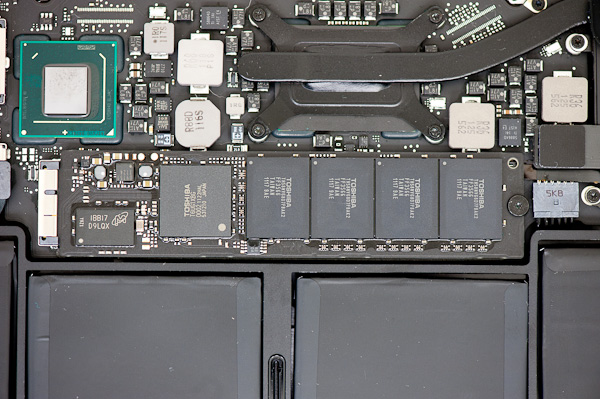
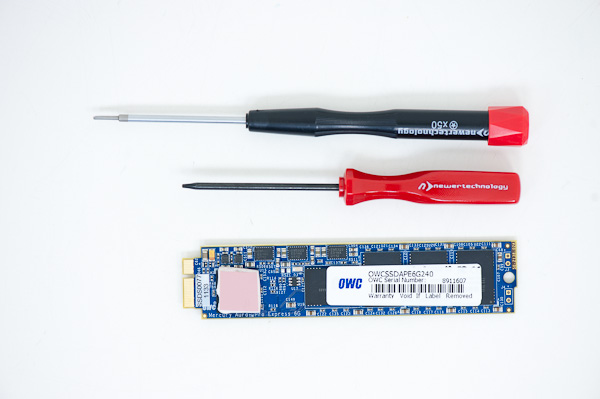






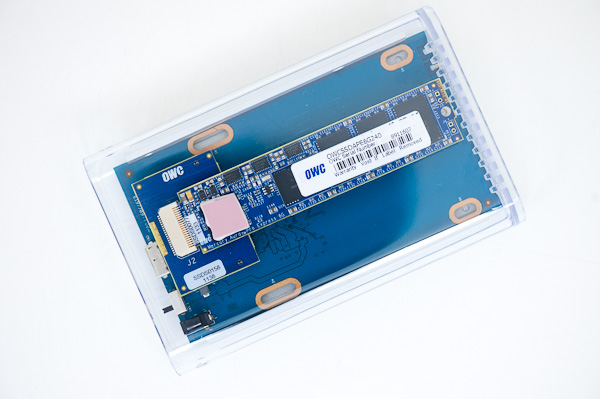
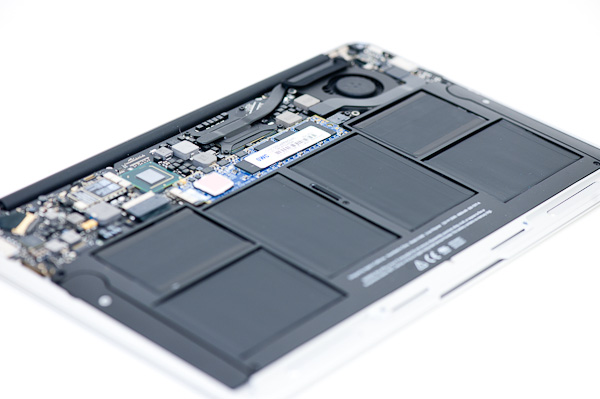
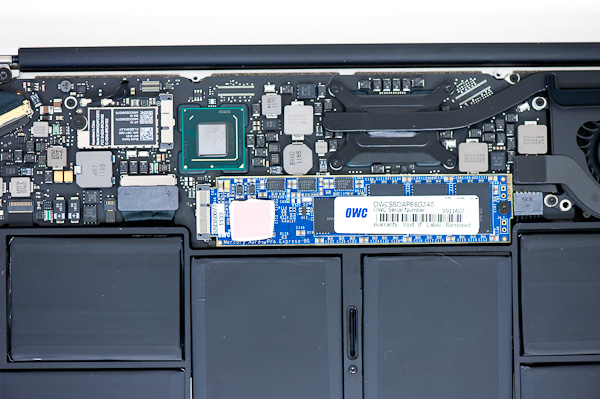








39 Comments
View All Comments
dagamer34 - Wednesday, November 9, 2011 - link
The Toshiba SSD is so bad, I feel like you're getting shafted. At this point, Apple should just ditch them since they are definitely causing slower performance compared to a Samsung SSD.BrianTho2010 - Wednesday, November 9, 2011 - link
I agree they should dump Toshiba, but they most likely have not due to long term supply contracts with Toshiba. I imagine that if Toshiba can not get their act together, Apple will not renew the SSD supply contract, but in the mean time Apple is stuck with junk SSD's from Toshiba.Calin - Thursday, November 10, 2011 - link
Apple is constrained not by performance, but by production capacity. In order not to have items "out of stock", they'll use whatever SSDs they can find (as long as the producer can produce them, give a decent warranty, and make them both error-free and long living). Oh, and respond well to increases in requests, and be geographically separated (such as a quake or typhoon or tsunami doesn't destroy all the production).Until another partner can be identified that does all of this AND gives faster drives is identified, selected and taken in chains... I mean contracts signed - Toshiba is there to stay
TheGaussianFunk - Thursday, November 10, 2011 - link
You guys are missing the point completely. The OWC SSD is using TOSHIBA modules also..... I'm assuming Apple can't source the high-end modules in the quantity and time-frame they need it in.GotThumbs - Thursday, November 10, 2011 - link
OR.......... Apple chooses to use the older (less expensive) components and maintain the HIGH profit margins in continues to make. I would bet that a high % of Apple laptop owners have no clue what technology is inside their laptop...just that its an Apple book and looks Cool. Why else would a large number of email, FB, web-surfing users spend so much money when they can get a PC for around half the cost.Apple has a marketing advantage in that many people will buy thier products regardless of cost because it's a fashion accessory for many of these people (IMO).
bji - Thursday, November 10, 2011 - link
It's more than looking cool. It has unique functionality and a unique interface that some people value. Sorry you are too dumb to understand that.wkw1766 - Friday, November 11, 2011 - link
"Sorry you are too dumb to understand that.". What is with the chip on your shoulder? Kind of a harsh reaction to someone elses opinion.ex2bot - Friday, November 11, 2011 - link
I, too, disagree with your assessment. There are unknowledgeable Mac buyers just as there are unknowledgeable Windows machine buyers. There are also knowledgeable buyers who choose to pay more for the advantages the Macs offer, such as superior design and construction, support, and OS X.Of couse, there are also knowledgeable Windows buyers. If someone can live without the design and construction, and sees no advantage in the often superior tech support and in OS X, then, sure, they're not going to want to pay more. Different perspectives. But to belittle all Mac owners because their values differ from yours makes you seem ignorant.
I'm an expert user myself, but I've had to deal with Apple a few times for warranty repair (mostly optical drives), and I appreciate dealing with someone from the U.S. who doesn't insult my intelligence. I've experienced how HP has jerked some of my friends around for warranty repair, and I've read numerous accounts of abysmal support from HP and other manufacturers.
Bot
Mac Fanbot
MySchizoBuddy - Friday, November 11, 2011 - link
I would bet that a high % of "PC" laptop owners have no clue what technology is inside their PC laptop.Focher - Tuesday, November 15, 2011 - link
This argument died with the MacBook Air (and iPad and iPhone) because competitors price their matching models at the same (or sometimes higher) price points.As every independent review (supported by personal experience) has highlighted, the MacBook Air is a very fast machine from an end user perspective. While technology sites can do deep testing to highlight performance differences, it doesn't make a bit of difference to the vast majority of users.
Your argument does hold true to an extent. The "large number of email, FB, web-surfing users" could easily get by on something else. An iPad.